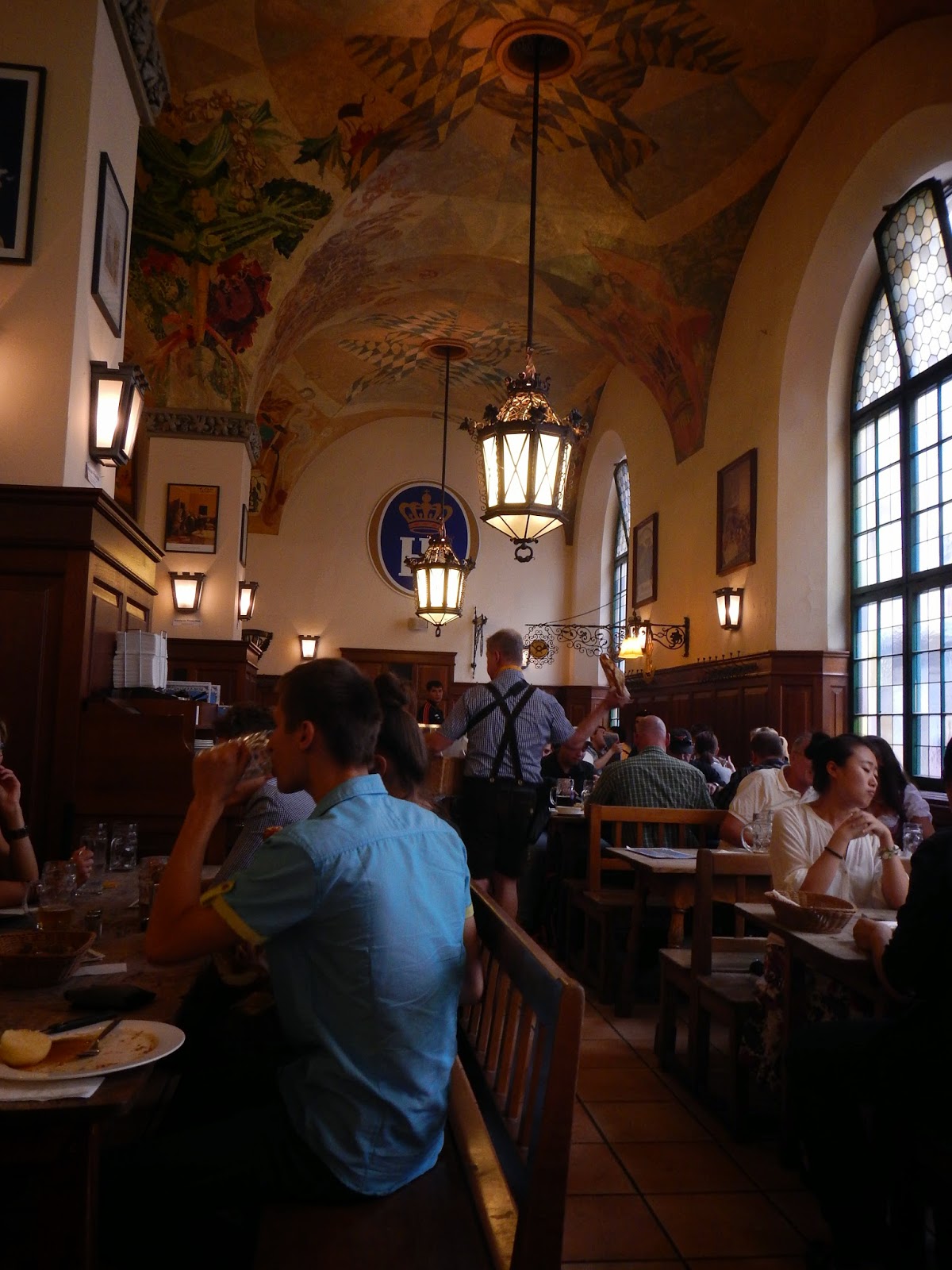This post will be wholly devoted to beer.
The beer culture here in Bavaria is mostly just lagers and Hefeweizen beer. Due to the strict German Purity Law, there is little variation among the different beers here in Germany and not a lot of experimentation. However, German beer is by and far the most consistently good beer. You know exactly what you are getting into when you order.
 |
| An elaborate restaurant front featuring the label of my favorite beer: Franziskaner. |
There are 6 major local brews in Germany: Spaten, Hofbrau, Lowenbrau, Paulaner, Augustiner, and Hacker-Pschorr
. Each of them have their own beer gardens located around the city of Munich and it is a neat activity to find all of them.
 |
| Augustiner |
 |
| Paulaner |
 |
Hofbrau
Unfortunately, I didn't have time to get some Lowenbrau, Spaten, or Hacker-Pschorr. |
Everybody will tell you to go to the world famous Hofbrau Beer Garden. It is fun if you like a packed, loud, tourist attraction. Go once for the experience and a checkmark. Also note that in the evenings, this is where a lot of pub crawls end up and so it tends to get pretty rowdy.
 |
| Can you imagine the large barrels of beer? |
 |
| The large, noisy Hofbrau Haus! Plenty of lederhosens, dirndls, and beer! |
Personally, I recommend the Augustiner Keller Beer Garden and the Chinese Pagoda Beer Garden. The Augustiner Keller restaurant has a great beer cellar seating area, but get there before 2000 if you want to get a seat. The Chinese Pagoda Beer Garden is a bit of a trek, but completely worth the trip on a sunny day.
 |
| The Chinese Pagoda Beer Garden |
Typically the pilsners, lagers, are the ones you can order in the large 1 liter beer mugs. Hefeweizen are usually served in tall 750 mL glasses, to allow optimal aromas to reach your nose.
 |
| My all time favorite Weissbier! |
 |
| The beer garden associated with my all time favorite Weissbier. The beer garden is located in an interior courtyard. |
Also two stories about the beer in Munich. The first involves its role during the Thirty Years War. When the Swedes invaded Munich, the city was so pretty they didn't want to raze it. However, they wanted a financial sum from the city to pay their army. When the city of Munich scraped together all the wealth in the city; it was not enough. To make up the difference, the citizens of Munich offered their entire store if beer. The Prussians gladly accepted the "liquid gold" and left the city intact.
The other story involves the Munich Opera House. During the construction of the opera house in 1818, the designers put in a safeguard against fires in the all wood interior. They designed a sprinkler system based off of rainwater collection and the shape of the ceiling. A basin would collect rainwater and distribute the water along canals in the roof in the event of a fire. However, they didn't plan on fires during the winter. During a cold night in Munich, a fire broke out in the opera house. The theater manager went to turn on the sprinkler system, but unfortunately the rainwater was now completely frozen. To try and put out the fire, beer was brought from the Hofbrau House in a firefighter line. Unfortunately, people cared more about free beer than a burning opera house and so buckets of beer started at the beginning of the line full and were empty by the time the bucket reached the fire. Needless to say the opera house burnt down. However, there is now an agreement between the Hofbrau House and the opera house to provide beer in case of fire at the opera house.
Also remember two phrases when you are in Munich: "Ich mochten (pronounced merc-tan) ein bier, bitte" and "Prolst!" (Translation: "I would like one beer" and "Cheers!", respectively)









No comments:
Post a Comment